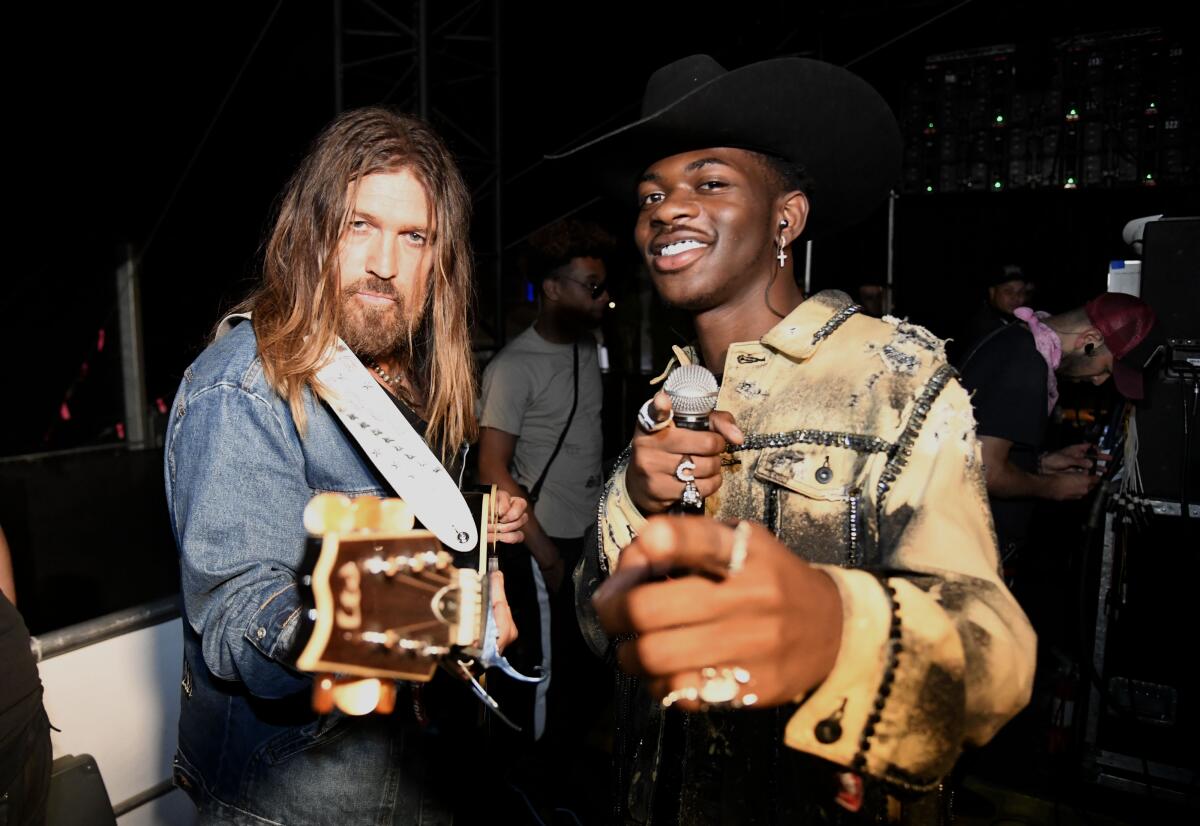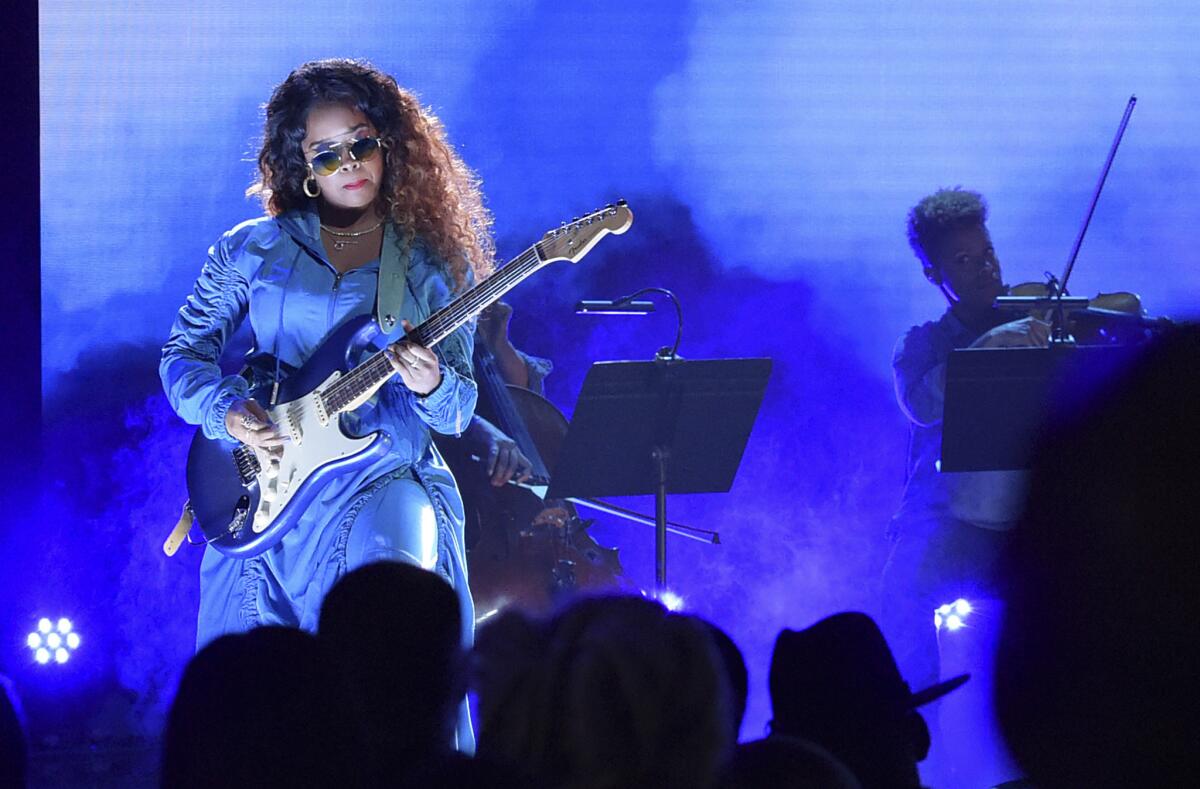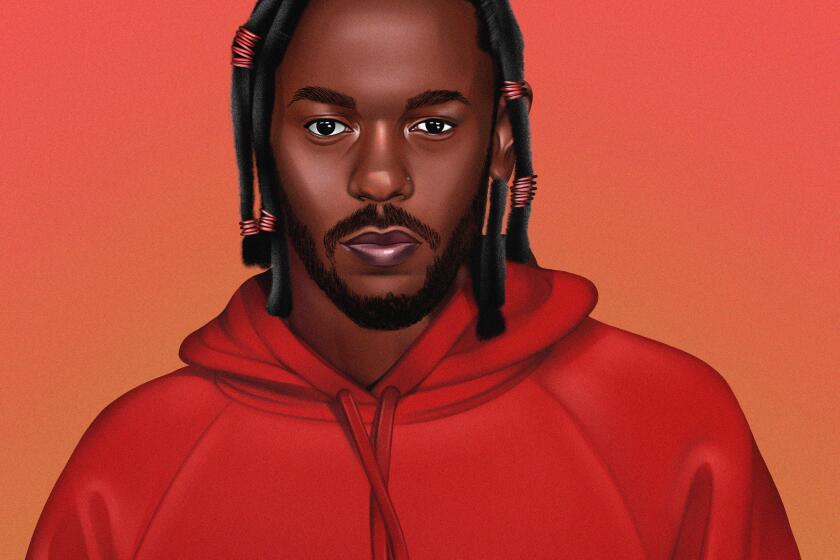Lizzo, Billie Eilish, Lil Nas X lead historically diverse, youthful Grammy 2020 nominations

Freshman-class recording artists Lizzo, Billie Eilish and Lil Nas X collectively landed 20 Grammy Award nominations for 2020 on Wednesday, as the Recording Academy, which determines nominees and, ultimately, award recipients, wholeheartedly embraced the music industry’s newest faces and sounds.
The singer, rapper and instrumentalist Lizzo, 31, whose sassy empowerment songs became unexpected chart-topping anthems, leads the field with eight nominations. Seventeen-year-old goth-pop phenom Eilish, who tied with rapper Lil Nas X for the second-most nominations with six, and Lizzo further distinguished their nascent careers by landing nominations in all of the Grammys’ top four general categories: record, album, song and best new artist, the first time in the awards’ 62-year history that two artists have done so in the same year.
Nominations were revealed in New York during a televised announcement on CBS by Deborah Dugan, the Recording Academy’s new president and chief executive; the academy’s board chair, Harvey Mason Jr.; Alicia Keys, who will host the upcoming ceremony; singer Bebe Rexha and “CBS This Morning” anchor Gayle King.
Eilish, a native of Los Angeles’ Highland Park, also earns the distinction of becoming the youngest artist in Grammy history nominated for album of the year, for her chart-topping debut, “When We All Fall Asleep, Where Do We Go?”
“I never thought it would be a reality in my life,” she told The Times recently when asked about the prospect of Grammy recognition. “I grew up watching the Grammys with my family. I would judge all the girls’ dresses and all the dudes’ suits. To think about sitting in a room with, like, every person I grew up idolizing,” Eilish added, “is terrifying.”
The history-making aspect of the latest Grammy slate extends to Lil Nas X, the openly gay rapper who earned nominations for record, album and new artist, propelled by his genre-hopping, record-breaking hit single “Old Town Road.”
“Today’s announcement reflects a new era for the Recording Academy — an army of engaged members that welcomes diversity, embraces creativity and champions young musicians on the rise,” Dugan said in a statement issued Wednesday.
The nominations recognize hundreds of musicians, songwriters, producers and engineers stretching across 84 categories spanning pop, rock, rap, R&B, country, folk, gospel, Latin music, jazz, classical and film music. Winners will be announced Jan. 26 at Staples Center in Los Angeles in a ceremony that will be telecast on CBS.
With its nomination slate dominated by so many young acts, women and hip-hop artists, the academy also tacitly has embraced the shifting tides of music consumption today. Increasingly left behind is the old model: music in physical form predominantly exposed via terrestrial radio. In the digital age, artists cultivate audiences for their music through a plethora of new outlets such as TikTok —the social media platform that gave Lil Nas X’s “Old Town Road” its initial attention — before seeing it more broadly disseminated by dominant streaming services such as Spotify and Apple Music.
The other album of the year nominees are plaintive indie-rocker Bon Iver, singer-songwriter Lana Del Rey, pop singer Ariana Grande, R&B singer-guitarist H.E.R. and long-running alt-rock group Vampire Weekend.
Among the biggest surprises was the single nomination in the top four categories for Taylor Swift, whose seventh album, “Lover,” was the year’s biggest seller as well as being widely praised by critics.
The title track earned her a nomination among song of the year contenders, joining Lady Gaga’s “Always Remember Us This Way” from “A Star Is Born”; Eilish’s “Bad Guy”; veteran country star Tanya Tucker’s comeback hit “Bring My Flowers Now”; H.E.R.’s “Hard Place”; Del Rey’s “Norman F— Rockwell”; Scottish singer-songwriter Lewis Capaldi’s wounded ballad “Someone You Loved”; and Lizzo’s breakthrough hit “Truth Hurts.”
The best new artist nominations include one of the day’s big surprises: Black Pumas, the nascent Austin, Texas-based duo of singer Eric Burton and guitarist-producer Adrian Quesada, who earned a Grammy nomination individually in 2008 for his playing on Grupo Fantasmo’s album “Sonidos Gold” in the Latin rock or alternative album category.
Along with Black Pumas, Eilish, Lizzo and Lil Nas X in the new artist competition are indie-rock singer-songwriter Maggie Rogers, New Orleans R&B-funk collective Tank and the Bangas, Spanish flamenco pop singer Rosalía, fresh off her five wins at last week’s Latin Grammy Awards, and English soul singer-songwriter Yola.

In addition to Lizzo’s “Truth Hurts,” Eilish’s “Bad Guy” and Lil Nas X’s “Old Town Road” — the remix version he released in collaboration with country singer Billy Ray Cyrus — the record of the year nominations, which award musical performance and record production, are Bon Iver’s “Hey, Ma,” Grande’s “7 Rings,” H.E.R.’s “Hard Place,” Khalid’s “Talk” and Post Malone and Swae Lee’s “Sunflower.”
The most nominated artists following Lizzo, Eilish and Lil Nas X, with five each, are Beyoncé — also notable in her absence from the top four categories — H.E.R. and Eilish’s brother and musical collaborator, Finneas O’Connell.
The emphasis on new faces left some artists who had become Grammy favorites as little as a decade ago with little to show for their 2019 efforts: In addition to Swift, whose three nominations also include pop solo performance for her single “You Need to Calm Down” and pop vocal album for “Lover,” English pop phenomenon Ed Sheeran received just a single nomination, in the pop vocal album category for “No. 6 Collaborations Project.” Canadian rapper, singer and blockbuster hit maker Drake was nominated twice: in the R&B and rap song categories.
Bolstering the ranks of former Grammy favorites left wanting this year is Bruce Springsteen. The veteran New Jersey rocker landed no nominations for either of two recordings he released during the eligibility period: “Springsteen on Broadway,” the audio from his one-man theatrical production, and “Western Skies,” his well-reviewed studio album channeling expansive themes and orchestral sounds of 1960s and ‘70s California pop recordings.
Lady Gaga collected three nominations related to her music in “A Star is Born”: Beyond the best song nod, the album is recognized in the compilation soundtrack for visual media category, and the song “I’ll Never Love Again” is a contender for song written for visual media.

Although this year’s nominations signal the Recording Academy membership’s support for artists and recordings that are at the heart of the most important conversations over pop music in 2019 — such as the blurring of genre lines as exemplified in “Old Town Road” — the hard proof of voters’ commitment to a new definition of musical currency will come with the announcement of winners in January. It’s the annual awards ceremony that often is the source of the most pointed groans and grimaces over the entire Grammy process.
This year’s Grammys are being watched closely as a bellwether of changes within the Recording Academy, uppermost being the recent arrival of Dugan, whose job took effect Aug. 1.
Beyond the specifics of the latest slate of awards nominations are key issues looming for the Recording Academy, and the music industry itself, chief among them equal access for women, people of color and the LGBTQ community.
The academy continues to rebound from and respond to a 2018 study conducted by the USC Annenberg Inclusion Initiative showing that in top Grammy Award categories during the preceding five years, male musicians received 91% of the awards, with 9% going to women.
Asked about the imbalance following the 2018 Grammy Awards, the academy’s then-president, Neil Portnow, said the time had come for women to “step up” to achieve parity, a remark that unleashed a hailstorm of blowback and led to some artists and music industry executives calling for him to step down. Another large percentage of awards that year to male recipients also sparked a #GrammysSoMale protest on social media.
Soon after, the academy formed a task force to explore “conscious and unconscious” instances of bias within the music business, which long has been heavily male-dominated. That group has begun making recommendations on institutional changes designed to remedy biases that have come to light, among them statistics showing that barely more than 12% songwriters of the 600 most popular songs of the previous six years were women, and only 2% of producers across 300 songs were female.
The Grammys have also taken considerable heat for the paucity of influential hip-hop artists making it to the winner’s circle in the overall record, album, single and best new artist categories. This year’s nominations will do little to mute that criticism, as no entries from the categories of rap performance, rap/sung performance, song and album were recognized in the higher-profile general categories.
Some rap observers thought Tyler, the Creator might warrant such attention, but the former leader of the Odd Future hip-hop collective had to settle for a single nod in rap album for his critically acclaimed album “Igor.”
Recording Academy officials say the measure of success isn’t a specific number of nominees or winners from any particular race, gender or musical genre, but in fomenting industry-wide confidence that the screening and voting processes are free of impediments to equal representation.
“What we wanted was to make sure there was going to be more diversity in the process, not a set of quotas in the winners,” task force chief Tina Tchen told The Times last year. “We want good decisions to be made.
“The area we thought was most important to influence was the composition of the committees,” she said. “I do believe in the research, and all the research shows that diverse teams make better decisions.”
Portnow, 71, ultimately did step down on July 31 this year, at the end of his latest contract with the academy, following 17 years leading the organization.
The reins have been handed to Dugan, who comes to the Recording Academy from her previous post as chief executive at (RED), the AIDS nonprofit, founded in 2006 by U2 singer Bono and activist Bobby Shriver.
Before leading (Red), Dugan served stints as a Wall Street mergers and acquisition lawyer, president of Disney Publishing Worldwide, executive vice president of EMI Records Group/Angel Records as well as her current role as co-chair of the storytelling nonprofit the Moth.
“All the issues that Neil has addressed have led us to a larger conversation, and that is a conversation, of course, that we need to have about women and diversity in music,” Dugan told The Times when her appointment was announced. “Where we take it and how we use this organization to affect positive change, that’s one of the questions I’m most excited to answer.”
Based on the task force’s initial recommendations, the academy has reconfigured some awards review and nominating committees to create more diverse panels to evaluate the music under consideration for the industry’s highest awards. The academy also heightened its outreach efforts to recruit more women, people of color and younger music industry personnel.
The Recording Academy comprises about 25,000 professional and student members. About 13,000 are voting members who determine the annual Grammy Awards. Recordings released between Oct. 1, 2018, and Aug. 31, 2019, were eligible for consideration.
More to Read
The biggest entertainment stories
Get our big stories about Hollywood, film, television, music, arts, culture and more right in your inbox as soon as they publish.
You may occasionally receive promotional content from the Los Angeles Times.











